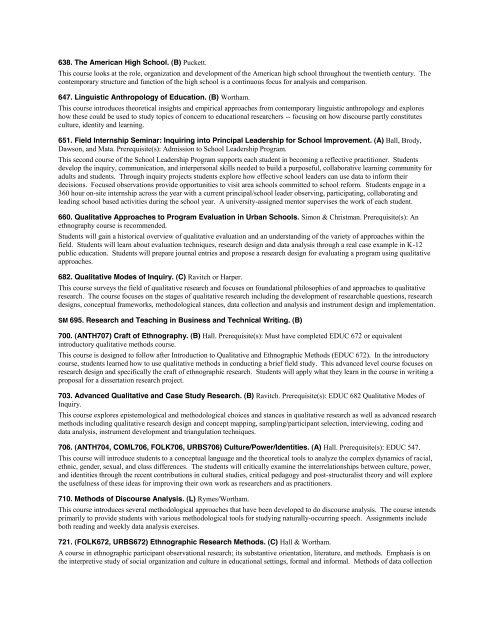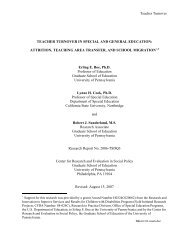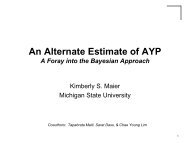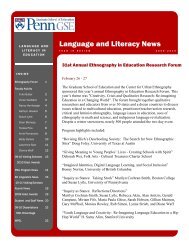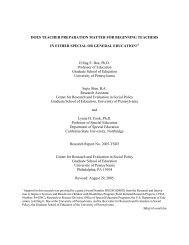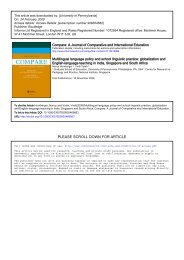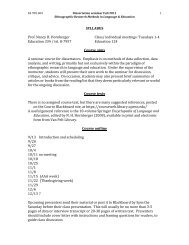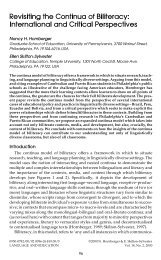EDUCATION (ED) {EDUC} - Penn GSE
EDUCATION (ED) {EDUC} - Penn GSE
EDUCATION (ED) {EDUC} - Penn GSE
Create successful ePaper yourself
Turn your PDF publications into a flip-book with our unique Google optimized e-Paper software.
638. The American High School. (B) Puckett.<br />
This course looks at the role, organization and development of the American high school throughout the twentieth century. The<br />
contemporary structure and function of the high school is a continuous focus for analysis and comparison.<br />
647. Linguistic Anthropology of Education. (B) Wortham.<br />
This course introduces theoretical insights and empirical approaches from contemporary linguistic anthropology and explores<br />
how these could be used to study topics of concern to educational researchers -- focusing on how discourse partly constitutes<br />
culture, identity and learning.<br />
651. Field Internship Seminar: Inquiring into Principal Leadership for School Improvement. (A) Ball, Brody,<br />
Dawson, and Mata. Prerequisite(s): Admission to School Leadership Program.<br />
This second course of the School Leadership Program supports each student in becoming a reflective practitioner. Students<br />
develop the inquiry, communication, and interpersonal skills needed to build a purposeful, collaborative learning community for<br />
adults and students. Through inquiry projects students explore how effective school leaders can use data to inform their<br />
decisions. Focused observations provide opportunities to visit area schools committed to school reform. Students engage in a<br />
360 hour on-site internship across the year with a current principal/school leader observing, participating, collaborating and<br />
leading school based activities during the school year. A university-assigned mentor supervises the work of each student.<br />
660. Qualitative Approaches to Program Evaluation in Urban Schools. Simon & Christman. Prerequisite(s): An<br />
ethnography course is recommended.<br />
Students will gain a historical overview of qualitative evaluation and an understanding of the variety of approaches within the<br />
field. Students will learn about evaluation techniques, research design and data analysis through a real case example in K-12<br />
public education. Students will prepare journal entries and propose a research design for evaluating a program using qualitative<br />
approaches.<br />
682. Qualitative Modes of Inquiry. (C) Ravitch or Harper.<br />
This course surveys the field of qualitative research and focuses on foundational philosophies of and approaches to qualitative<br />
research. The course focuses on the stages of qualitative research including the development of researchable questions, research<br />
designs, conceptual frameworks, methodological stances, data collection and analysis and instrument design and implementation.<br />
SM 695. Research and Teaching in Business and Technical Writing. (B)<br />
700. (ANTH707) Craft of Ethnography. (B) Hall. Prerequisite(s): Must have completed <strong>ED</strong>UC 672 or equivalent<br />
introductory qualitative methods course.<br />
This course is designed to follow after Introduction to Qualitative and Ethnographic Methods (<strong>ED</strong>UC 672). In the introductory<br />
course, students learned how to use qualitative methods in conducting a brief field study. This advanced level course focuses on<br />
research design and specifically the craft of ethnographic research. Students will apply what they learn in the course in writing a<br />
proposal for a dissertation research project.<br />
703. Advanced Qualitative and Case Study Research. (B) Ravitch. Prerequisite(s): <strong>ED</strong>UC 682 Qualitative Modes of<br />
Inquiry.<br />
This course explores epistemological and methodological choices and stances in qualitative research as well as advanced research<br />
methods including qualitative research design and concept mapping, sampling/participant selection, interviewing, coding and<br />
data analysis, instrument development and triangulation techniques.<br />
706. (ANTH704, COML706, FOLK706, URBS706) Culture/Power/Identities. (A) Hall. Prerequisite(s): <strong>ED</strong>UC 547.<br />
This course will introduce students to a conceptual language and the theoretical tools to analyze the complex dynamics of racial,<br />
ethnic, gender, sexual, and class differences. The students will critically examine the interrelationships between culture, power,<br />
and identities through the recent contributions in cultural studies, critical pedagogy and post-structuralist theory and will explore<br />
the usefulness of these ideas for improving their own work as researchers and as practitioners.<br />
710. Methods of Discourse Analysis. (L) Rymes/Wortham.<br />
This course introduces several methodological approaches that have been developed to do discourse analysis. The course intends<br />
primarily to provide students with various methodological tools for studying naturally-occurring speech. Assignments include<br />
both reading and weekly data analysis exercises.<br />
721. (FOLK672, URBS672) Ethnographic Research Methods. (C) Hall & Wortham.<br />
A course in ethnographic participant observational research;; its substantive orientation, literature, and methods. Emphasis is on<br />
the interpretive study of social organization and culture in educational settings, formal and informal. Methods of data collection


